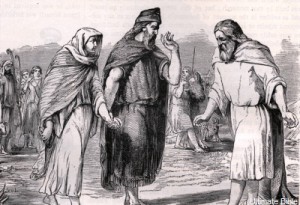Wisdom 7:7-11
7 Therefore I prayed, and understanding was given me; I called upon God, and the spirit of wisdom came to me.
8 I preferred her to scepters and thrones, and I accounted wealth as nothing in comparison with her.
9 Neither did I liken to her any priceless gem, because all gold is but a little sand in her sight, and silver will be accounted as clay before her.
10 I loved her more than health and beauty, and I chose to have her rather than light, because her radiance never ceases.
11 All good things came to me along with her, and in her hands uncounted wealth.
Wisdom, in the Judeo-Christian sense, is impossible to attain alone, isolated, by individual achievement. It takes a reliance on God outside of yourself, reaching out to God, and talking to Him intimately. I prayed and understanding was given; I called upon God and wisdom came to me. It takes praying, calling on God, to make things happen. Prayer is a real, intimate experience with God and incalculable good comes from it.
In this passage Solomon compares wisdom to things in life that people often covet: power, money, health, and beauty. He refers to wisdom with feminine pronouns – isn’t this fitting? She is preferred to political power, wealth is nothing compared to her, all gold is but a little sand, and even light is unnecessary as her radiance never ceases. The main point is that the pursuit of wisdom is vitally important. This is a crucial theme throughout both the Hebrew Bible and the Christian New Testament.
Today this desire for wisdom is too-often forgotten about and underemphasized, by Christians nearly as much as non-Christians. There are few things more important than being a wise person. The unwise leave themselves open to manipulation, they make poor choices that affect their lives and the lives around them, and they struggle through life to a greater degree in general. That is why it is more important today than ever to remember that, with wisdom, all good things will come along with her, and in her hands is uncounted wealth.
Erik Ritland is a journalist and musician from St. Paul, Minnesota. The Weekly Ramble, released on Saturdays, compiles his many weekly articles about society, music, sports (including a football blog), religion, and many other topics. You can reach him via email here.

